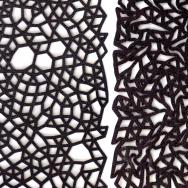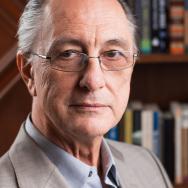Three University of Chicago scholars have been elected to the American Philosophical Society, the oldest learned society in the United States.
Profs. Sidney Nagel, David Tracy and David Wellbery are among the 34 new members honored this year from a wide variety of academic disciplines. Announced May 5, the 2020 class also includes two UChicago alumni: current Librarian of Congress Carla Hayden, AM’77, PhD’87; and renowned primatologist Jeanne Altmann, PhD’79.
Sidney Nagel is the Stein-Freiler Distinguished Service Professor of Physics. He is currently interested in how disordered systems can exhibit more flexible behavior than their ordered counterparts. He is also a pioneer in studying non-linear and far-from-equilibrium behavior in fluids; examples are when a drop of liquid splashes on a solid object or is placed on a very hot surface, or when a tendril of honey is spooned from one dish to another. Phenomena such as these can open doors into new realms of physics.
Nagel is a fellow of the American Physical Society, the American Association for the Advancement of Science, and the American Academy of Arts and Sciences, as well as a member of the National Academy of Sciences.
A noted Catholic teacher, scholar, priest and theologian, David Tracy is the Andrew Thomas Greeley and Grace McNichols Greeley Distinguished Service Professor Emeritus of Catholic Studies. He is also Professor Emeritus of Theology and the Philosophy of Religions at the Divinity School and the John U. Nef Committee on Social Thought.
Tracy’s work has focused on contemporary theology, philosophical, systematic and constructive theology and hermeneutics, and on issues and persons in religion and modern thought. Tracy has lectured in more than 50 universities and colleges around the world, including Scotland, where he delivered the prestigious Gifford Lectures, which were established to promote and diffuse the study of natural theology.
He is the author of many influential essays and books, including The Analogical Imagination: Christian Theology and the Culture of Pluralism; On Naming the Present: God, Hermeneutics, and Church, Plurality and Ambiguity; Blessed Rage for Order; and two books of his essays—Fragments: the Existential Situation of Our Time (2020) and Filaments: Theological Profiles (2020). He is currently writing a book based on his Gifford Lectures, “Infinity and Naming God.”
Through his analysis of the work of Johann Wolfgang von Goethe, David E. Wellbery, the LeRoy T. and Margaret Deffenbaugh Carlson University Professor in Germanic Studies and the John U. Nef Committee on Social Thought, has transformed scholarly understanding of a pivotal cultural period in Europe surrounding the dawn of the 19th century. He compares the importance of Goethe in the history of German culture to that of Shakespeare in England and Dante in Italy.
As a scholar of Goethe and the epoch of European culture he embodied, Wellbery has enlarged the understanding of Goethe’s work and of German literature and culture. He has also made his mark through several essential publications. Fluent in English and German, Wellbery has written books on Goethe in both languages.
His most significant scholarship on Goethe includes the books The Specular Moment: Goethe’s Early Lyric and the Beginnings of Romanticism (1996) and Goethe’s Faust I: Reflections on the tragic form (2016), as well as the essay collection Seiltänzer des Paradoxalen: Aufsätze zur Ästhetischen Wissenschaft (2006). He is the editor-in-chief of the critical anthology A New History of German Literature (2005), which also has appeared in German translation.

